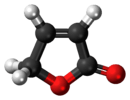2-Furanone
| |||
| Names | |||
|---|---|---|---|
| IUPAC name
5H-furan-2-one | |||
| Other names
furan-2-one, γ-crotonolactone, butenolide | |||
| Identifiers | |||
| 497-23-4 | |||
| 3D model (Jmol) | Interactive image | ||
| ChEBI | CHEBI:38118 | ||
| ChEMBL | ChEMBL166223 | ||
| ChemSpider | 9917 | ||
| ECHA InfoCard | 100.007.128 | ||
| KEGG | C17601 | ||
| MeSH | butenolide | ||
| PubChem | 10341 | ||
| |||
| |||
| Properties | |||
| C4H4O2 | |||
| Molar mass | 84.07336 | ||
| Density | 1.185 g/cm3, liquid | ||
| Melting point | 4 to 5 °C (39 to 41 °F; 277 to 278 K)[1] | ||
| Boiling point | 86 to 87 °C (187 to 189 °F; 359 to 360 K) 12 mm Hg[1] | ||
| Except where otherwise noted, data are given for materials in their standard state (at 25 °C [77 °F], 100 kPa). | |||
| | |||
| Infobox references | |||
2-Furanone, also known as γ-crotonolactone (GCL), is a heterocyclic organic compound. Classified as a lactone, this colourless liquid is colloquially called "butenolide." As a class of compounds, substituted derivatives, which are not in fact prepared from the parent 2-furanone, are called butenolides.
Synthesis and reactions
2-Furanone is prepared by oxidation of furfural:[2]
It exists in equilibrium with the tautomer 2-hydroxyfuran, which serves as an intermediate in the interconversion between the β- and α-furanones. The β form is the more stable. The interconversion is catalyzed by base.
2-Furanones can be converted to furans by a two-step process of reduction followed by dehydration. First the carbon-oxygen double bond is reduced by trimethylsilylation of the oxygen centre.
See also
- 5-hydroxy-2(5H)-furanone
- pyrone slightly larger
References
- 1 2 Sigma-Aldrich Chemicals Product detail
- ↑ Näsman, Jan H. (1990). "3-Methyl-2(5H)-furanone". Organic Syntheses. 68: 162. doi:10.15227/orgsyn.068.0162.


